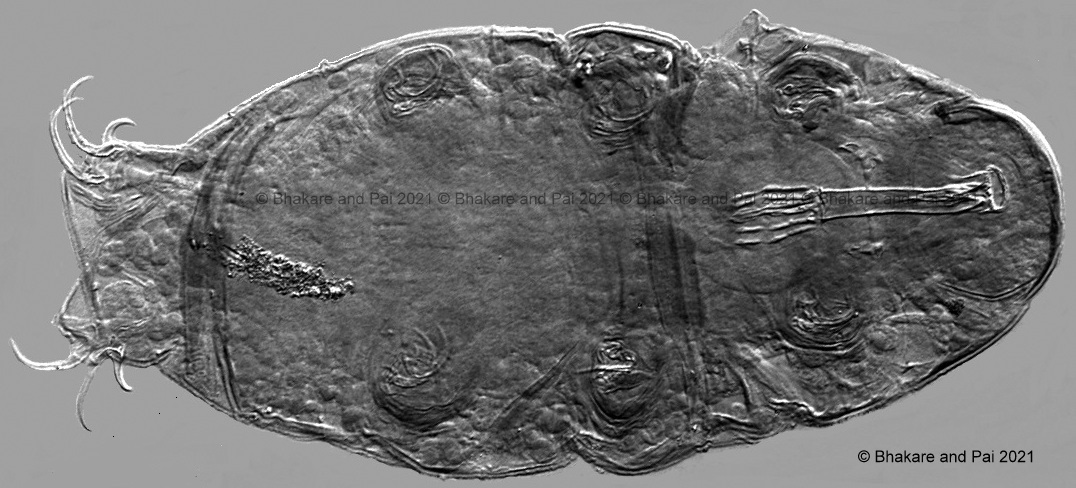Another Jewel in the Crown of Freshwater Biodiversity of Western Ghats

Pune, 9th November 2021: Tardigrades fondly called as ‘water bears’ are known to tolerate wide range of extreme environments.These extremophiles recently gained attention from all over the world because of their ability to withstand space conditions by undergoing into the cryptobiotic state. In such condition they can tolerate extreme high and freezing temperatures, survive in vacuum, extreme radiation and can live many years in desiccated state.
Recently, researchers from Zoology department, Savitribai Phule Pune University,Kalyani Bhakare and Dr. Kalpana Pai, published a report on freshwater tardigrdade fauna of Western Ghats. Tardigrades were first reported from India during early 20 th century.Since then there have been scant reports on tardigrades from India. After 6 years of excruciating research for presence of tardigrades in the Western Ghats of Maharashtra, they stumbled upon tardigrade species. It’s a gratifying experience for the investigators to report the first ever freshwater forms specially from Maharashtra.
There has been a huge gap in reporting of species of microinvertebrate mainly attributed to meagre funding by agencies. In this regard, this report should bring excitement into Tardigrada research for their unique life forms and life history. Researching on them can be promising for humankind for elucidating the secrets of their adaptation to extreme conditions, said Dr. Kalpana Pai, Professor, Dept. of Zoology, SPPU.
Tardigrades are probably the cutest animals of microinvertebrate world. They are unique in their own way. Our Western Ghats are home to diverse aquatic ecosystems and even more diverse fascinating organisms. Temporary habitats or ephemeral habitats formed due to accumulation of rainwater, are one of such interesting habitats which harbour unique micro-invertebrates including tardigrades. These habitats are threatened due to increasing ecotourism and other anthropogenic pressures. We must conserve these habitats and the flora and fauna dependent on them; otherwise we may lose these species even before we discover them, said the researchers. Moreover, tardigrades being the extremophiles have the potential to survive in space.
In India, when it comes to space science research, more attention is given to physics, chemistry and technology aspects, which is important, however, at the same time we tend to forget that the new technology we are developing- can it help human race survive in outer space? Towards this, we need to study the effect of space conditions on living organisms to understand the fundamentals of adaptations of biological processes and physiology to space conditions. In this regard, tardigrades have the potential to be developed as a model system for space studies especially in the Indian context. Our space Agency ISRO should open their gates of funding for studies on astrobiology, said Kalyani Bhakare.
Indeed, a new course on Astrobiology has been announced by Prof. Nitin Karmalkar, the Vice Chancellor of Savitibai Phule Pune University, in the teaching curriculum of SPPU along with IUCAA,Pune. The researchers have discussed their rarity and uniqueness with respect to their ecology in the Western Ghats of Maharashtra. They have also discovered a new species which will be subsequently described and reported.
Quote
The study conducted by the prof Kalpana Pai and research student of Department of Zoology is very important in terms of biodiversity and future space reaserch. The work done by the researchers is admirable.
– Dr. Nitin Karmalkar, Vice Chancellor
Savitribai Phule Pune University





